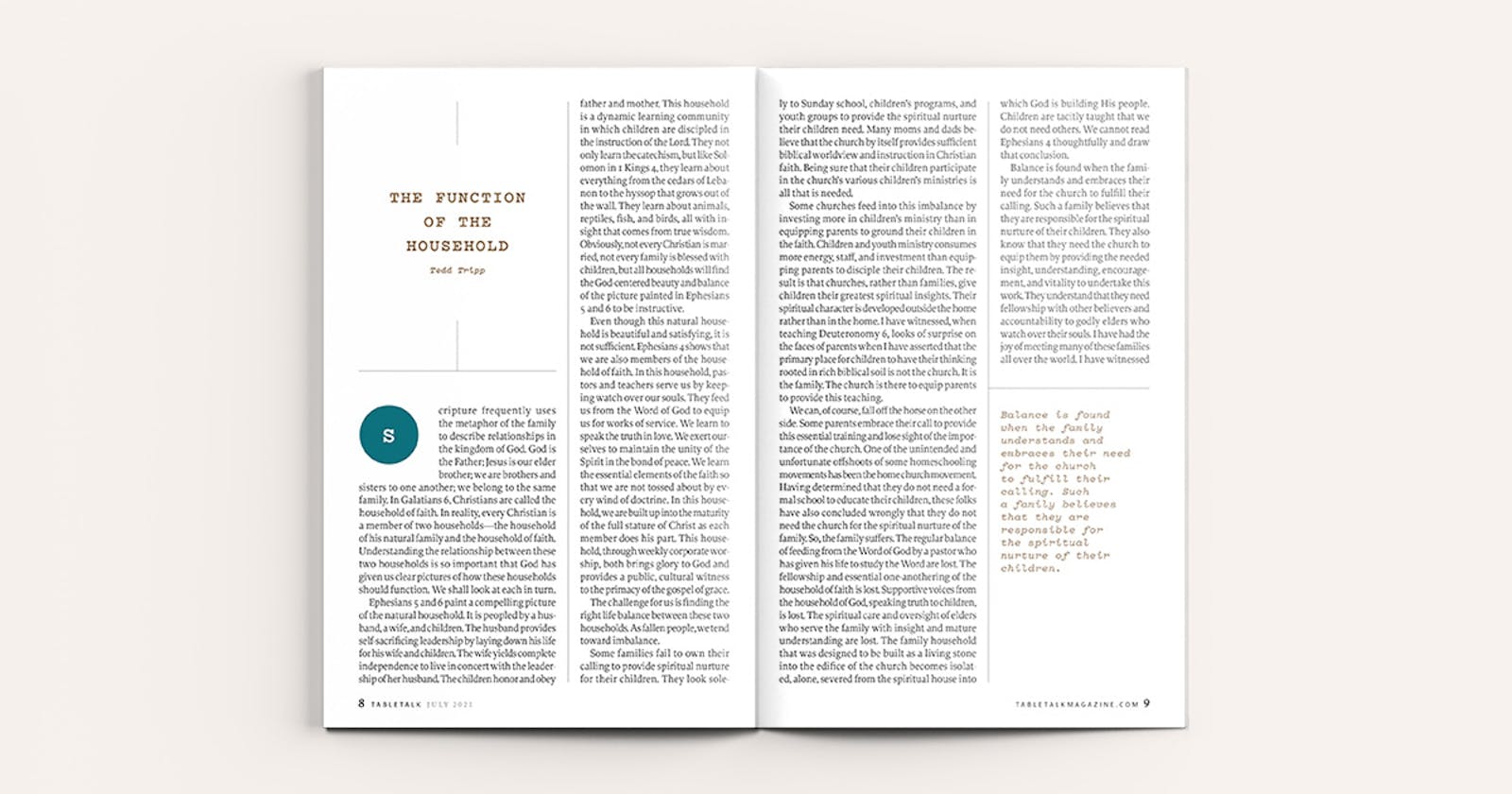
Request your free, three-month trial to Tabletalk magazine. You’ll receive the print issue monthly and gain immediate digital access to decades of archives. This trial is risk-free. No credit card required.
Try Tabletalk NowAlready receive Tabletalk magazine every month?
Verify your email address to gain unlimited access.
Scripture frequently uses the metaphor of the family to describe relationships in the kingdom of God. God is the Father; Jesus is our elder brother; we are brothers and sisters to one another; we belong to the same family. In Galatians 6, Christians are called the household of faith. In reality, every Christian is a member of two households—the household of his natural family and the household of faith. Understanding the relationship between these two households is so important that God has given us clear pictures of how these households should function. We shall look at each in turn.
Ephesians 5 and 6 paint a compelling picture of the natural household. It is peopled by a husband, a wife, and children. The husband provides self-sacrificing leadership by laying down his life for his wife and children. The wife yields complete independence to live in concert with the leadership of her husband. The children honor and obey father and mother. This household is a dynamic learning community in which children are discipled in the instruction of the Lord. They not only learn the catechism, but like Solomon in 1 Kings 4, they learn about everything from the cedars of Lebanon to the hyssop that grows out of the wall. They learn about animals, reptiles, fish, and birds, all with insight that comes from true wisdom. Obviously, not every Christian is married, not every family is blessed with children, but all households will find the God-centered beauty and balance of the picture painted in Ephesians 5 and 6 to be instructive.
Even though this natural household is beautiful and satisfying, it is not sufficient. Ephesians 4 shows that we are also members of the household of faith. In this household, pastors and teachers serve us by keeping watch over our souls. They feed us from the Word of God to equip us for works of service. We learn to speak the truth in love. We exert ourselves to maintain the unity of the Spirit in the bond of peace. We learn the essential elements of the faith so that we are not tossed about by every wind of doctrine. In this household, we are built up into the maturity of the full stature of Christ as each member does his part. This household, through weekly corporate worship, both brings glory to God and provides a public, cultural witness to the primacy of the gospel of grace.
The challenge for us is finding the right life balance between these two households. As fallen people, we tend toward imbalance.
Some families fail to own their calling to provide spiritual nurture for their children. They look solely to Sunday school, children’s programs, and youth groups to provide the spiritual nurture their children need. Many moms and dads believe that the church by itself provides sufficient biblical worldview and instruction in Christian faith. Being sure that their children participate in the church’s various children’s ministries is all that is needed.
Some churches feed into this imbalance by investing more in children’s ministry than in equipping parents to ground their children in the faith. Children and youth ministry consumes more energy, staff, and investment than equipping parents to disciple their children. The result is that churches, rather than families, give children their greatest spiritual insights. Their spiritual character is developed outside the home rather than in the home. I have witnessed, when teaching Deuteronomy 6, looks of surprise on the faces of parents when I have asserted that the primary place for children to have their thinking rooted in rich biblical soil is not the church. It is the family. The church is there to equip parents to provide this teaching.
We can, of course, fall off the horse on the other side. Some parents embrace their call to provide this essential training and lose sight of the importance of the church. One of the unintended and unfortunate offshoots of some homeschooling movements has been the home church movement. Having determined that they do not need a formal school to educate their children, these folks have also concluded wrongly that they do not need the church for the spiritual nurture of the family. So, the family suffers. The regular balance of feeding from the Word of God by a pastor who has given his life to study the Word are lost. The fellowship and essential one-anothering of the household of faith is lost. Supportive voices from the household of God, speaking truth to children, is lost. The spiritual care and oversight of elders who serve the family with insight and mature understanding are lost. The family household that was designed to be built as a living stone into the edifice of the church becomes isolated, alone, severed from the spiritual house into which God is building His people. Children are tacitly taught that we do not need others. We cannot read Ephesians 4 thoughtfully and draw that conclusion.
Balance is found when the family understands and embraces their need for the church to fulfill their calling. Such a family believes that they are responsible for the spiritual nurture of their children. They also know that they need the church to equip them by providing the needed insight, understanding, encouragement, and vitality to undertake this work. They understand that they need fellowship with other believers and accountability to godly elders who watch over their souls. I have had the joy of meeting many of these families all over the world. I have witnessed their joy in being purposeful about training their children and fully committed to the household of God.

God has designed the church to support and extend the ministry of the family for the nurture and development of children. The church supports and models the character qualities we desire in our children. This is especially important in today’s culture where everything our children hear is contrary to Christian values. The culture does not support biblical structures of morality, ethics, or authority. Consider the ways that the church provides essential support for the family.
Corporate worship in which God is reverently and joyfully honored with thanksgiving gives weight and significance to the family’s practice of Bible reading, singing, and prayer. Family worship is daily practice preparing both heart and mind for corporate worship.
The normative authority of the Bible is foundational for the teaching, life, and practice of the household of God. Just as you work in your household to follow the absolutes and principles of Scripture and apply them to the “stuff” of life, so the church underscores God’s law as satisfying and necessary for an edifying and productive life.
Concepts of hierarchy and accountability to God and to the authorities that He has established are important in the church as in the home. Being accountable to God-ordained authority is necessary for successful living. As parents submit to the leaders God has placed over them in the church, children are being taught to submit to mom and dad. Children, like all of us, need loving authority for protection from our own sin and folly. Submission is a beautiful concept that yields the fruit of a biblical sense of well-being, protection, fulfillment, and security to all who understand the blessing of God’s order in the world. Christ modeled submission for us by always doing the will of the Father. Both family and the church illustrate that submission is not servile but dignified and noble. Roles define the practice of submission both in the home and in the church. All human beings are equal in value and dignity, but God has established differing roles for us to fulfill. Christ’s submission to the Father in redemption shows that submission does not mean inferiority.
Both the family and the church bear concern for “the least of us.” Our homes and the church are gracious and welcoming. We have compassion on people who suffer in all sorts of trials. We rejoice in diversity of persons, gifts, and abilities.
Many other examples of ways the church and home are interdependent could be marshaled to illustrate the importance of both in the Christian’s life. The educational function of the church is essential for the educational vision of the family. The familial nature of relationships between brothers and sisters in the church model and mirror godly relationships in the family. Active participation in the household of faith encourages and motivates attention to schedules and priorities that yield productive lives.
I trust the interdependence of the household of the family and the household of faith is apparent. The family cannot be effective and productive without the church.
I have presented an ideal to strive for. It is not achieved by assenting to concepts and ideas. It is a work of God within. The grace for these things is found in being “renewed in the spirit of your minds,” as Paul says Ephesians 4:23. In Christ, we “put on the new self, created after the likeness of God in true righteousness and holiness” (v. 24).
